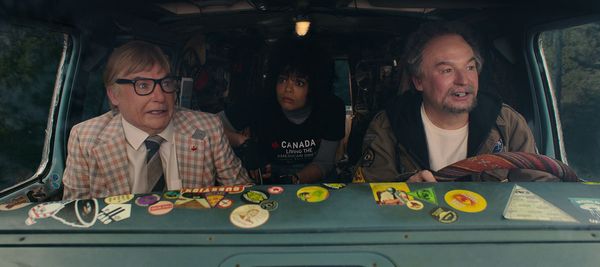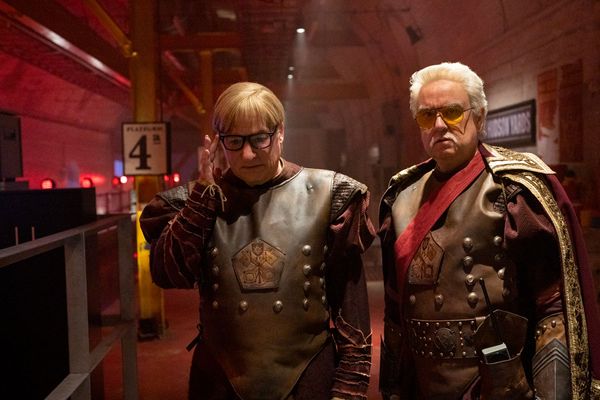
People stopped looking for Mike Myers some time ago. That's not unusual for most "Saturday Night Live" alumni, even those who enjoy a measure of notoriety after their tenure at Studio 8H inside 30 Rockefeller Plaza winds down. The David Spades, Dana Carveys and Will Fortes of the world will always be with us, making cameo appearances or popping up in sitcoms.
But Myers ranks among the greats – one of the guys who didn't simply make movies, but set the bar for a time of what an "SNL" movie should be. "Wayne's World" and the "Austin Powers" films – "Austin Powers: International Man of Mystery," "Austin Powers: The Spy Who Shagged Me" and "Austin Powers in Goldmember" – made Myers one of the hottest comedy stars of the 1990s.
In the Aughts he insinuated himself into the hearts of Millennials and Gen Z by becoming the voice of Shrek, joined by the all star of "SNL" all stars, Eddie Murphy.
Comedy fans were always wondering what Murphy was up to, mainly since his legacy was kept alive by the inheritors of his mantle – Chris Rock and Dave Chappelle, among others. Myers, on the other hand, may have been a bit easier to forget because he was so very linked to a time on the show when his character and their catchphrases defined it. He was terrific at losing himself beneath wigs, latex prosthetics and funny voices. As his featherweight Netflix limited series "The Pentaverate" proves, he still is.
RELATED: David Spade: This is why Eddie Murphy hated me
If you're not bowled over by the eight rubbery faces Myers cycle through its six episodes, maybe it's because they're only slightly removed from versions of his characters you've laughed with before but whose humor feels crustily outdated in 2022.
Even the show's setting, inside of a '60s-style mod lair that houses the support structure for a secret society of five men that's been quietly shaping society for the greater good, has a Dr. Evil-adjacency about it. That's fine for anyone whose love of all things shagadelic hasn't abated.
Several profiles over the years mention four- or five-year periods during which he lets ideas cook, which sometimes produces charming pieces like his 2013 documentary "Supermench: The Legend of Shep Gordon" and in others results in "The Love Guru," an abominable heap best left in 2008.
To anyone paying attention to the happenings in the overall "SNL" graduate universe, Myers' return to the classic comfort of rubber masks and spirit gum feels like less of a matter of "Where has he been?" than "Does he realize what year it is?"

Not every "SNL" actor goes on to greatness, but the ones who enjoy some career longevity display a willingness to stretch beyond the physical slapstick that enabled them to seize the spotlight and Lorne Michael's favor. Some former "SNL" performers have found success by remaining in their wheelhouse, namely Seth Meyers, who transitioned his successful run on "Weekend Update" into making the "Late Night" brand more politically incisive.
Others remain a such outsized presence in popular culture that we don't need to explain why. We simply have to drop their names: Tina Fey. Amy Poehler. Kristen Wiig. Maya Rudolph.
There's Will Ferrell and Andy Samberg, guys who can still carry a movie, in Ferrell's case, or in Samberg's, a sitcom.
Performers like Bill Hader and Adam Sandler stretched into dramas long before we stopped associating them with their late-night goofiness. Wiig did the same, as did Rudolph and Fey. Their work in indie films enabled us to view their range to inoculate them from being locked into comedies forever, even if comedy is where their hearts may be as performers and producers.
Want a daily wrap-up of all the news and commentary Salon has to offer? Subscribe to our morning newsletter, Crash Course.
Hader, in fact, provides the current version of the ideal model of via "Barry," a black-as-night comedy that also allows him to be grim, vulnerable and absolutely frightening. Even as Stefon, Hader was very much in his own skin.
Murphy has retained his stature, and it gave him a run of successful family movies starting with "The Nutty Professor" remake. Long before that he'd also proven he could star in action movies like "48 Hours." Afterward he went on earn Oscar-nominated acclaim with his work in "Dreamgirls" and a Golden Globe nod for "Dolemite Is My Name."
I cite these examples to drive the point home that while these folks established themselves as comedy forces who can act, Myers never fully escaped the prosthetics and parody closet he constructed for himself. Perhaps that's on purpose.
His major example of playing it straight, "54," has become a cult classic but bombed when it was first released. That, along with his understated cameo in "Inglourious Basterds," proves he's capable of more than cornily crafted dick jokes. (Myers' other memorable dramatic role was his unscripted appearance during the fundraising telethon for Hurricane Katrina next to Kanye West when the latter said, "George Bush doesn't care about Black people.")

"The Pentaverate" is an extension of a joke Myers drops in his 1993 vehicle "So I Married an Axe Murderer," one of those flicks that was more appreciated in its video rental afterlife than in theaters. It's also one of the few times we see Myers' natural face, playing a regular, likable guy who isn't obscured by fake jowls, contact lenses and mops of synthetic hair. Of course, he also plays a number of those types too. But it came in the same year as "Wayne's World 2," neither of which performed well.
Four years later came the first "Austin Powers" . . . and ever since, the masks have changed but the humor hasn't.
Admittedly there's a simple sweetness to "The Pentaverate" that defies criticism, which is probably why Netflix didn't make it available to critics for review. People who love Myers' work will certainly adore it, as will those who share his profound fondness for British sketch humor, Monty Python in particular. Roles he wrote for Jennifer Saunders ("Absolutely Fabulous") and Keegan-Michael Key pay homage to their legacy in ways their fans should appreciate.
Regardless of this, it is a very strange move for an artist who's been out of the spotlight for so long to return with a throwback engine fueled by a nostalgia for his career's highlights. His part in David O. Russell's upcoming period piece may shift his direction yet again, but for now, it's as if he's aware that people tend to love a concept of him as opposed to who he is. To his audiences Myers is a jovial fairytale ogre, or a swinging spy or a random Canadian with a Scottish brogue. But it also provides an answer to why we haven't kept up with Myers all this time. It may be because we've never truly seen him before.
"The Pentaverate" is currently streaming on Netflix. Watch a trailer for it below, via YouTube.
More stories like this:
- "Officer? I would like to report a joke"
- Howie Mandel "afraid" of attack on stage
- "Barry" gets funnier as it goes darker
- "Uncut Gems" & the cost of looking elite







